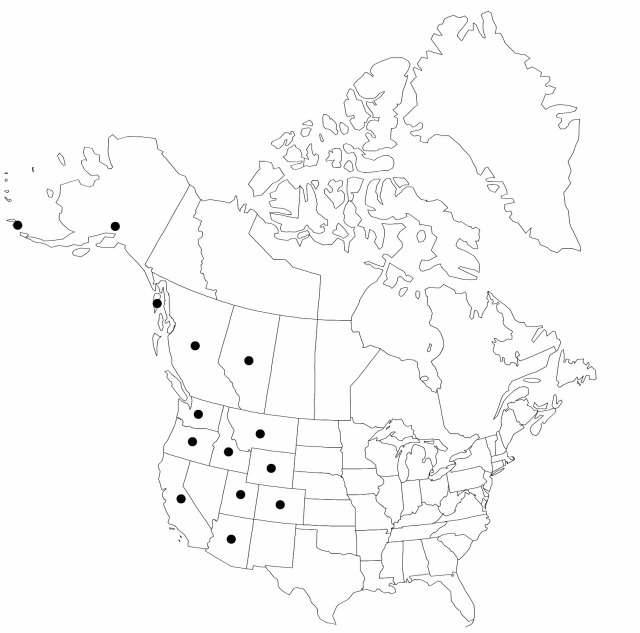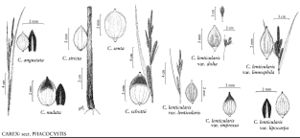Difference between revisions of "Carex lenticularis var. lipocarpa"
Syst. Bot. Monogr. 7: 67. 1985.
FNA>Volume Importer |
FNA>Volume Importer |
||
| Line 10: | Line 10: | ||
|name=Carex vulgaris var. lipocarpa | |name=Carex vulgaris var. lipocarpa | ||
|authority=T. Holm | |authority=T. Holm | ||
| + | |rank=variety | ||
|publication_title=Amer. J. Sci. | |publication_title=Amer. J. Sci. | ||
|publication_place=167: 308. 1904 | |publication_place=167: 308. 1904 | ||
| Line 16: | Line 17: | ||
|name=Carex hindsii var. brevigluma | |name=Carex hindsii var. brevigluma | ||
|authority=Kükenthal | |authority=Kükenthal | ||
| + | |rank=variety | ||
}} {{Treatment/ID/Synonym | }} {{Treatment/ID/Synonym | ||
|name=Carex kelloggii | |name=Carex kelloggii | ||
|authority=W. Boott | |authority=W. Boott | ||
| + | |rank=species | ||
}} {{Treatment/ID/Synonym | }} {{Treatment/ID/Synonym | ||
|name=Carex lenticularis var. paullifructus | |name=Carex lenticularis var. paullifructus | ||
|authority=Kükenthal | |authority=Kükenthal | ||
| + | |rank=variety | ||
}} | }} | ||
|hierarchy=Cyperaceae;Carex;Carex sect. Phacocystis;Carex lenticularis;Carex lenticularis var. lipocarpa | |hierarchy=Cyperaceae;Carex;Carex sect. Phacocystis;Carex lenticularis;Carex lenticularis var. lipocarpa | ||
| Line 37: | Line 41: | ||
|elevation=0–3000 m | |elevation=0–3000 m | ||
|distribution=Alta.;B.C.;Alaska;Ariz.;Calif.;Colo.;Idaho;Mont.;Oreg.;Utah;Wash.;Wyo. | |distribution=Alta.;B.C.;Alaska;Ariz.;Calif.;Colo.;Idaho;Mont.;Oreg.;Utah;Wash.;Wyo. | ||
| − | |discussion=<p><i>Carex lenticularis </i>var.<i> lipocarpa</i> is the most abundant member of the species in western North America. It is distinguished from the other western taxa by the green, short-stipitate, ellipsoid perigynia and the elongate inflorescence; it is distinguished from the eastern < | + | |discussion=<p><i>Carex lenticularis </i>var.<i> lipocarpa</i> is the most abundant member of the species in western North America. It is distinguished from the other western taxa by the green, short-stipitate, ellipsoid perigynia and the elongate inflorescence; it is distinguished from the eastern <i></i>var.<i> lenticularis</i> by the black scales and the red-brown beak orifice.</p><!-- |
--><p>Despite the morphologic similarity of <i>Carex lenticularis </i>var.<i> lenticularis</i> and <i>C. lenticularis </i>var.<i> lipocarpa</i> and the apparent intergradation where the two ranges come into contact, there appears to have been some divergence in chromosome numbers.</p> | --><p>Despite the morphologic similarity of <i>Carex lenticularis </i>var.<i> lenticularis</i> and <i>C. lenticularis </i>var.<i> lipocarpa</i> and the apparent intergradation where the two ranges come into contact, there appears to have been some divergence in chromosome numbers.</p> | ||
|tables= | |tables= | ||
| Line 47: | Line 51: | ||
-->{{#Taxon: | -->{{#Taxon: | ||
name=Carex lenticularis var. lipocarpa | name=Carex lenticularis var. lipocarpa | ||
| − | |||
|authority=(Holm) L. A. Standley | |authority=(Holm) L. A. Standley | ||
|rank=variety | |rank=variety | ||
| Line 62: | Line 65: | ||
|publication year=1985 | |publication year=1985 | ||
|special status= | |special status= | ||
| − | |source xml=https://jpend@bitbucket.org/aafc-mbb/fna-data-curation.git/src/ | + | |source xml=https://jpend@bitbucket.org/aafc-mbb/fna-data-curation.git/src/f50eec43f223ca0e34566be0b046453a0960e173/coarse_grained_fna_xml/V23/V23_699.xml |
|genus=Carex | |genus=Carex | ||
|section=Carex sect. Phacocystis | |section=Carex sect. Phacocystis | ||
Revision as of 20:10, 16 December 2019
Culms 15–90 cm. Leaf blades 2–4 mm wide. Inflorescences: peduncle of proximal spike 1 cm or longer; proximal bract red-brown at base, 1.5–3 mm wide. Spikes: proximal 3–7 spikes pistillate, 1.5–2.5 cm × 2.5–4 mm; terminal spike staminate. Pistillate scales red-brown or black. Perigynia 5–7-veined on each face, ovoid or ellipsoid, 2–3.5 × 1–1.8 mm; stipe 0.2–0.5 mm; beak red-brown, 0.1–0.5 mm. 2n = 92.
Phenology: Fruiting Aug.
Habitat: Lakeshores, wet meadows
Elevation: 0–3000 m
Distribution

Alta., B.C., Alaska, Ariz., Calif., Colo., Idaho, Mont., Oreg., Utah, Wash., Wyo.
Discussion
Carex lenticularis var. lipocarpa is the most abundant member of the species in western North America. It is distinguished from the other western taxa by the green, short-stipitate, ellipsoid perigynia and the elongate inflorescence; it is distinguished from the eastern var. lenticularis by the black scales and the red-brown beak orifice.
Despite the morphologic similarity of Carex lenticularis var. lenticularis and C. lenticularis var. lipocarpa and the apparent intergradation where the two ranges come into contact, there appears to have been some divergence in chromosome numbers.
Selected References
None.
